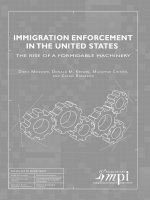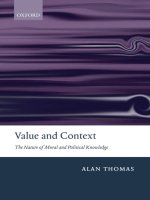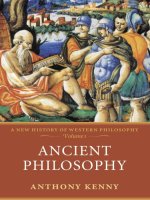- Trang chủ >>
- Khoa Học Tự Nhiên >>
- Vật lý
the rise of modern philosophy a new history of western philosophy volume 3 sep 2006
Bạn đang xem bản rút gọn của tài liệu. Xem và tải ngay bản đầy đủ của tài liệu tại đây (6.89 MB, 371 trang )
The Rise of Modern Philosophy
This page intentionally left blank
A NEW HISTORY OF WESTERN PHILOSOPHY
volume iii
The Rise of Modern Philosophy
anthony
kenny
CLARENDON PRESS Á OXFORD
3
Great Clarendon Street, Oxford ox2 6dp
Oxford University Press is a department of the University of Oxford.
It furthers the University’s objective of excellence in research, scholarship,
and education by publishing worldwide in
Oxford New York
Auckland Cape Town Dar es Salaam Hong Kong Karachi
Kuala Lumpur Madrid Melbourne Mexico City Nairobi
New Delhi Shanghai Taipei Toronto
With oYces in
Argentina Austria Brazil Chile Czech Republic France Greece
Guatemala Hungary Italy Japan Poland Portugal Singapore
South Korea Switzerland Thailand Turkey Ukraine Vietnam
Oxford is a registered trade mark of Oxford University Press
in the UK and in certain other countries
Published in the United States
by Oxford University Press Inc., New York
ß Sir Anthony Kenny 2006
The moral rights of the author have been asserted
Database right Oxford University Press (maker)
First published 2006
All rights reserved. No part of this publication may be reproduced,
stored in a retrieval system, or transmitted, in any form or by any means,
without the prior permission in writing of Oxford University Press,
or as expressly permitted by law, or under terms agreed with the appropriate
reprographics rights organization. Enquiries concerning repro duction
outside the scope of the above should be sent to the Rights Department,
Oxford University Press, at the address above
You must not circulate this book in any other binding or cover
and you must impose the same condition on any acquirer
British Library Cataloguing in Publication Data
Data available
Library of Congress Cataloguing in Publication Data
Data available
Typeset by SPI Publisher Services, Pondicherry, India
Printed in Great Britain
on acid-free paper by
Biddles Ltd, King’s Lynn, Norfolk
ISBN 0–19–875277–6 978–0–19–875277–6
13579108642
SUMMARY OF CONTENTS
List of Contents vii
Map x
Introduction xi
1. Sixteenth-Century Philosophy 1
2. Descartes to Berkeley 33
3. Hume to Hegel 80
4. Knowledge 117
5. Physics 165
6. Metaphysics 181
7. Mind and Soul 212
8. Ethics 246
9. Political Philosophy 273
10. God 303
Chronology 332
List of Abbreviations and Conventions 333
Bibliography 337
List of Illustrations 344
Index 347
This page intentionally left blank
CONTENTS
Map x
Introduction xi
1. Sixteenth-Century Philosophy 1
Humanism and Reform 1
Sin, Grace, and Freedom 5
Authority and Conscience 7
The Decline of Logic 11
Scepticism, Sacred and Profane 13
Counter-Reformation Philosophy 16
Giordano Bruno 20
Galileo 22
Bacon 26
2. Descartes to Berkeley 33
Descartes 33
Hobbes 41
The Cambridge Platonists 47
Locke 49
Pascal 53
Malebranche 58
Spinoza 61
Leibniz 70
Berkeley 76
3. Hume to Hegel 80
Hume 80
Smith and Reid 86
The Enlightenment 90
Rousseau 93
WolV and Lessing 97
Kant 100
Fichte and Schelling 108
Hegel 111
4. Knowledge 117
Montaigne’s Scepticism 117
Descartes’ Response 119
Cartesian Consciousness 121
The Empiricism of Hobbes 127
Locke’s Ideas 131
Spinoza on Degrees of Knowledge 137
The Epistemology of Leibniz 142
Berkeley on Qualities and Ideas 146
Hume on Ideas and Impressions 151
Kant’s Synthetic a priori 156
Realism vs Idealism 160
Idealist Epistemology 163
5. Physics 165
Natural Philosophy 165
Cartesian Physics 169
The Atomism of Gassendi 172
Newton 173
The Labyrinth of the Continuum 174
Kant’s Antinomies 177
6. Metaphysics 181
The Metaphysics of Suarez 181
Descartes on Eternal Truths 184
Three Notions of Substance 187
Single Necessary Substance 190
Making Room for Contingency 193
Berkeley’s Idealism 199
Hume on Causation 204
The Response of Kant 207
7. Mind and Soul 212
Descartes on Mind 212
Dualism and its Discontents 216
Determinism, Freedom, and Compatibilism 219
Locke on Personal Identity 223
The Soul as the Idea of the Body in Spinoza 227
CONTENTS
viii
Leibniz’s Monadology 231
Berkeley and Hume on Spirits and Selves 235
Kant’s Anatomy of the Mind 240
8. Ethics 246
Casuistry 247
Mysticism and Stoicism 251
Pascal against the Jesuits 253
Spinoza’s Ethical System 258
Hume on Reason, Passion, and Virtue 261
Kant on Morality, Duty, and Law 264
Hegel’s Ethical Synthesis 267
9. Political Philosophy 273
Machiavelli’s Prince 273
More’s Utopia 275
Just and Unjust Wars 281
Hobbes on Chaos and Sovereignty 283
Spinoza’s Political Determinism 289
Locke on Civil Government 290
Montesquieu on Law 293
Rousseau and the General Will 295
Hegel on the Nation-State 300
10. God 303
Molina on Omniscience and Freedom 303
Descartes’ Rational Theology 305
Pascal and Spinoza on God 308
The Optimism of Leibniz 312
The God of Berkeley 315
Hume on Religion 317
Kant’s Theological Dialectic 323
The Absolute of Hegel 329
Chronology 332
List of Abbreviations and Conventions 333
Bibliography 337
List of Illustrations 344
Index 347
CONTENTS
ix
Cloyne
Dublin
Derry
Glasgow
Edinburgh
London
Oxford
Chatsworth
Cambridge
Madrid
Valladolid
Granada
Pisa
Rome
Florence
Naples
Venice
Padua
Geneva
Zurich
Paris
la Fleche`
Vienna
Augsburg
Prague
Tübingen
Leipzig
Halle
Jena
Berlin
Warsaw
Königsberg
Stockholm
Wittenburg
Utrecht
Amsterdam
Leiden
500100 200 300 4000 miles
0 200 400 600 800 km
INTRODUCTION
T
his is the third volume of a projected four-volume history of phil-
osophy from the beginnings to the present day. The W rst volume,
Ancient Philosophy (2004), described the early centuries of philosophy in
classical Greece and Rome. The second volume, Medieval Philosophy (2005),
took the story from the conversion of St Augustine to the humanist
Renaissance. This volume takes up the narrative from the beginning of
the sixteenth century to the beginning of the nineteenth ce ntury. A Wnal
volume is planned to cover the history of philosophy from the age of Karl
Marx and John Stuart Mill up to the present day.
The present volume has the same structure as the two previous vol-
umes. In the Wrst three chapters I oVer a chronological survey of the
philosophical thinkers of the period. In the remaining chapters I oVer a
thematic treatment of their contribution to the discussion of particular
philosophical topics of abiding importance. Some readers are interested in
the history of philosophy principally because of the light it sheds on the
people and societies of the past. Other readers study the great dead
philosophers in order to seek illumination on themes of current philo-
sophical inquiry. By structurin g the book in this way I hope to cater for the
needs of both sets of readers. Those whose primary interest is historical
may focus on the chronological survey, referring where necessary to the
thematic sections for ampliWcation. Those whose primary interest is philo-
sophical will concentrate rather on the thematic sections of my volumes,
referring back to the chronological surveys to place particular issues in
context.
The audience at which these volumes are primarily aimed is at the level
of second- or third-year undergraduate study. However, many of those
interested in the history of philosophy are enrolled in courses that are not
necessarily philosophical. Accordingly, I try not to assume a familiarity
with contemporary philosophical techniques or terminology. Again, with
the exception of the original texts of the thinkers of the period I have not
included in the bibliography works in languages other than English.
I endeavour also to avoid jargon and to write suYciently clearly for my
history to attract those who read philosophy not for curricular purposes
but for their own enlightenment and entertainment.
This has been the easier to do since in the case of many of my historical
subjects I write of necessity as an amateur rather than as a professional. In
an age when the academic study of past philosophers has expanded
exponentially, no one person can read more than a fraction of the vast
secondary literature that has proliferated in recent years around every one
of the thinkers discussed in this volume. I have myself contributed to the
scholarly discussion of some of the great philosophers of the early modern
age, in particular Descartes; and I have published monographs on som e of
the subjects covered by my thematic chapters, such as the philosophy
of mind and the philosophy of religion. But in compiling the bibliography
for the volume I was made aware how vast was the extent of material I have
not read in comparison with the amount that I am familiar with.
Any single author who attempts to cover the entire history of philoso-
phy is quickly made aware that in matters of detail he is at an enormous
disadvantage in comparison with the scholars who have made individual
philosophers their Weld of expertise. By compensation, a history written by
a single hand may be able to emphasize features of the history of philoso-
phy that are less obvious in the works of committees of specialists, just as
an aerial photograph may bring out features of a landscape that are almost
invisible to those close to the ground.
To someone approaching the early modern period of philosophy from
an ancient and medieval background the most striking feature of the age is
the absence of Aristotle from the philosophic scene. To be sure, in the
period covered by this volume the study of Aristotle continued in the
academic establishment, and at Oxford University there has never been a
time since its foundation when Aristotle was not taught. But the other
striking characteristic of our period, which marks it oV from both the
Middle Ages and the twentieth century, is that it was a time when
philosophy was most energetically pursued not within universities but
outside them. Of all the great thinkers of the seventeenth and eighteenth
centuries, none before WolV and Kant held professorships of philosophy.
Both good and evil consequences resulted when philosophy turned its
back on Aristotle. For philosophy in the broad sense—philosophy as it was
understood during most of our period, to include the physical sciences as
INTRODUCTION
xii
‘natural philosophy’—the removal of Aristotle’s dead hand was a great
boon. Aristotle’s physics was hopelessly erroneous, and had been shown to
be so as early as the sixth century of our era; the deference that was paid
to it during the Middle Ages was a great brake on scientiWc progress. But for
philosophy in the narrow sense—philosophy as it is now practised as a
distinct discipline in universities—there were losses as well as gains result-
ing from the abandonment of Aristotle.
Our period is dominated by two philosophical giants, one at its begin-
ning and one at its end, Descartes and Kant. Descartes was a standard-
bearer for the rebellion against Aristotle. In metaphysics he rejected the
notions of potentiality and actuality, and in philosophical psychology he
substituted consciousness for rationality as the mark of the mental. Hobbes
and Locke founded a school of British empiricism in reaction to Cartesian
rationalism, but the assumptions they shared with Descartes were more
important than the issues that separated them. It took the genius of Kant
to bring together, in the philosophy of human understanding, the diVerent
contributions of the senses and the intellect that had been divided and
distorted by both empiricists and rationalists.
The hallmark of Cartesian dualism was the separation between mind
and matter, conceived as the separation of consciousness from clockwork.
This opened an abyss that hampered the metaphysical enterprise during
the period of this volume. On the one hand, speculative thinkers erected
systems that placed ever greater strains on the credulity of the common
reader. Whatever may be the defects of Aristotle’s hylomorphism, his
substances—things like cats and cabbages—did at least have the advantage
of undoubted existence in the everyday world, unlike unknowable sub-
strata, monads, noumena, and the Absolute. On the other hand, thinkers
of a more sceptical turn deconstructed not only Aristotelian substantial
forms, but primary and secondary qualities, material substances, and
eventually the human mind itself.
In the introduction to his lectures on the history of philosophy Hegel
warns against dull histories in which the succession of systems are repre-
sented simply as a number of opinons, erro rs, and freaks of thought. In
such works, he says, ‘the whole of the history of Philosophy becomes a
battleWeld covered with the bones of the dead; it is a kingdom not merely
formed of dead and lifeless individuals, but of refuted and spiritually dead
systems, since each has killed and buried the other’ (LHP, 17).
INTRODUCTION
xiii
Though I try to record faithfully the opinions of the successive philo-
sophers of my period, I hope that this volume will not fall under Hegel’s
censure. I believe that despite handicapping themselves by throwing away
some of the most valuable tools that philosophy had forged for itself in
Antiquity and in the Middle Ages, the philosophers of this period made
many contributions of permanent value, which are identiWed and described
in the thematic chapters. In the course of the book I hope to trace the
graph of both the gains and the losses. There is much to be learnt, I believe,
from studying even the vagaries of those whom Hegel calls ‘heroes of
thought’. Great philosophers in every age have engendered great errors: it
is no disrespect to them to try to expose some of the confusions to which
they appear to have succumbed.
The division into themes in this volume diVers from that in the previous
volumes in two ways. First, there is no special chapter devoted to logic and
language, since philosophers in our period made no contribution in these
areas at all comparable to that of the Middle Ages or that of the nineteenth
and twentieth centuries. (It is true that the period contains one logician of
genius, Leibniz; but his logical work had little impact until the nineteenth
century.) Second, there is for the Wrst time a chapter devoted to political
philosophy. It is only from the time of Machiavelli and More that the
political institutions of the age begin to bear suYcient similarity to those
under which we live now for the insights of political philosophers to be
relevant to contemporary discussions. The chapter on physics is briefer
than in previous volumes, because with Newton the history of physics
becomes part of the history of science rather than the history of philoso-
phy, leaving to philosophers, for a while at least, the abstract treatment of
the notions of space and time.
I am indebted to Peter MomtchiloV and his colleagues at Oxford
University Press, and to three anonymous readers for improving an earlier
draft of this volume.
INTRODUCTION
xiv
1
Sixteenth-Century Philosophy
Humanism and Reform
T
he decade beginning in 1511 can well be regarded as the high point of
the Renaissance. In the Vatican Raphael was frescoing the walls of the
papal apartments, while Michelangelo covered the ceiling of the Sistine
Chapel with his paintings. In Florence the Medici family, exiled since the
time of the reformer Savonarola, returned to power and patronage. One of
the oYcers of the former republic, Niccolo
`
Machiavelli, now under house
arrest, used his enforced leisure to produce a classic text of political
philosophy, The Prince, which oVered rulers frank advice on the acquisition
and retention of power. Renaissance art and Renaissance ideas travelled
northward as far as Germany and England. A colleague of Michelangelo’s
designed Henry VII’s tomb in Westminster Abbey and the foremost scholar
of the age, the Dutchman Desiderius Erasmus, lectured at Cambridge early
in the reign of his son Henry VIII. Erasmus was a frequent guest at the house
of Thomas More, a lawyer about to begin a political career that would
make him, brieXy, the most powerful man in England after the king.
Erasmus and More and their friends propounded in Northern Europe
the humanist ideas that had taken root in Italy in the previous century.
‘Humanism’ at that time did not mean a desire to replace religious values
with secular human ones: Erasmus was a priest who wrote best-selling
works of piety, and More was later martyred for his religious beliefs.
Humanists, rather, were people who believed in the educational value of
the ‘humane letters’ (literae humaniores) of the Greek and Latin classics. They
studied and imitated the style of classical authors, many of whose texts had
been recently rediscovered and were being published thanks to the newly
developed art of printing. They believed that their scholarship, applied to
ancient pagan texts, would restore to Europe long-neglected arts and
sciences, and, applied to the Bible and to ancient Church writers, would
help Christendom to a purer and more authentic understanding of Chris-
tian truth.
Humanists valued grammar, philology, and rhetoric more highly than
the technical philosophical studies that had preoccupied scholars during
the Middle Ages. They despised the Latin that had been the lingua franca of
medieval universities, far removed in style from the works of Cicero and
Livy. Erasmus had been unhappy studying at the Sorbonne, and More
mocked the logic he had been taught at Oxford. In philosophy, both of
them looked back to Plato rather than to Aristotle and his many medieval
admirers.
More paid a compliment to Plato by publishing, in 1516, a Wctional
blueprint for an ideal commonwealth. In More’s Utopia, as in Plato’s
Republic, property is held in common and women serve alongside men in
the army. More, writing in an age of exploration and discovery, pretended
that his state actually existed on an island a cross the ocean. Like Plato,
however, he was using the description of a Wctional nation as a vehicle for
theoretical political philosophy and for criticism of contemporary society.1
Erasmus was more sceptical about Plato as a guide to politics. In the
teasing Praise of Folly that he dedicated to More in 1511 he mocks Plato’s
claim that the happiest state will be ruled by philosopher kings. History
tells us, he says, ‘that no state has been so plagued by its rulers as when
power has fallen into the hands of some dabbler in philosophy’ (M, 100).
But when, in the same year as Utopia, he published his Instruction to a Christian
Prince, he did little but repeat ideas to be found in Plato and Aristotle. For
this reason his treatise of political philosophy has never achieved the
renown of Machiavelli’s or of More’s.
Erasmus was more interested in divinity than in philosophy, and he
cared more for biblical studies than for speculative theology. Scholastics
like Scotus and Ockham, he complained, merely choked with brambles
paths that had been made plain by earlier thinkers. Among the great
Christian teachers of the past his favourite was St Jerome, who had
translated the Bible from Hebrew and Greek into Latin. Erasmus worked
1 The political philosophy of Machiavelli and More is discussed at length in Ch. 9 below.
SIXTEENTH-CENTURY PHILOSOPHY
2
Desiderius Erasmus in Holbein’s portrait in the Louvre
SIXTEENTH-CENTURY PHILOSOPHY
3
for some years annotating the Latin New Testament, and then decided to
produce a Latin version of his own to amend corruptions which had crept
into the accepted text (‘the Vulgate’) and, where necessary, to improve on
Jerome himself. In 1516 he published his new Latin version along with his
annotations, and almost as an appendix, he added a Greek text of the New
Testament—the W rst one ever to be printed. In his Latin version, in striving
for Wdelity to the Greek original, he did not hesitate to alter even the most
beloved and solemn texts. The Wrst words of the fourth Gospel, In principio
erat verbum, became In principio erat sermo: what was in the beginning was not
‘the Word’ but ‘the Saying’.
Erasmus’ Latin version was not generally adopted, though passages of it
can still be read in the chapel windows of King’s College Cambridge.
However, the Greek text he published was the foundation for the great
vernacular testaments of the sixteenth century, beginning with the monu-
mental German version published in 1522 by Martin Luther.
Luther was an Augustinian monk, as Erasmus had been until released by
papal dispensation from his monastic commitments. Like Erasmus, Luther
had made a close study of St Paul’s Epistle to the Romans. This had made
him question fundamentally the ethos of Renaissance Catholicism. The year
after the publication of Erasmus’ New Testament Luther issued, in the
University of Wittenberg, a public denunciation of abuses of papal authority,
in particular of a scandalously promoted oVer of an indulgence (remission of
punishment due to sin) in return for contributions to the building of the
great new church of St Peter’s in Rome.
Erasmus and More shared Luther’s concern about the corruption of
many of the higher clergy: they had both denounced it in print, Erasmus
pungently in a satire on Pope Julius II, More with ironic circumspection in
Utopia. But both were alienated when Luther went on to denounce large
parts of the Catholic sacramental system and to teach that the one thing
needful for salvation is faith, or trust in the merits of Christ. In 1520 Pope
Leo X condemned forty-one articles taken from Luther’s teaching, and
followed this up with an excommunication after Luther had burnt the Bull
of Condemnation. King Henry VIII, with some help from More, published
an Assertion of the Seven Sacraments, which earned him the papal title ‘Defender
of the Faith’.
Erasmus strove in vain to dampen down the controversy. He tried to
persuade Luther to moderate his language, and to submit his opinions for
SIXTEENTH-CENTURY PHILOSOPHY
4
judgement to an impartial jury of scholars. On the other hand, he ques-
tioned the authenticity of the papal bull of condemnation and he
persuaded the emperor Charles V to give Luther a hearing at the Diet of
Worms in 1521. But Luther refused to recant and was placed under the ban
of the empire. Pope Leo died and was succeeded by a Dutch schoolfriend of
Erasmus, who took the name Adrian VI. The new pope urged Erasmus to
take up his pen against the reformers. Very reluctantly, Erasmus agreed,
but his book against Luther did not appear until 1524, by which time Pope
Adrian was dead.
Sin, Grace, and Freedom
The ground Erasmus chose for battle was Luther’s position on the freedom
of the will. This had been the subject of one of the theses which had been
nailed to the door at Wittenberg in 1517. Among the propositions con-
demned by Leo X was ‘freewill after sin is merely an empty title’. In
response, Luther reinforced his assertion. ‘Free will is really a Wction and
a label without reality, because it is in no man’s power to plan any evil or
good’ (WA VII.91).
In his Diatribe de Libero Arbitrio Erasmus piles up texts from the Old and
New Testament and from Church doctors and decrees to show that
human beings have free will. His constant theme is that all the exhort-
ations, promises, commands, threats, reproaches, and curses to be found in
the Scriptures would lose all point if it was necessity, and not free will, that
determined good or evil acts. Questions of Bible interpretation dominate
both Erasmus’ book and Luther’s much longer reply, De Servo Arbitrio.
Philosophically, Erasmus is unsubtle. He refers to, but does not improve
upon, Valla’s dialogue on free will. He repeats commonplaces of centuries
of scholastic debate which are inadequate responses to the problem of
reconciling divine foreknowledge with human freedom—he insists, for
instance, that even humans know many things that will happen in the
future, such as eclipses of the sun. A theory of free will that leaves us no
freer than the stars in their courses is not a very robust answer to Luther.
But Erasmus is anxious to avoid philosophical complications. It is a piece of
irreligious curiosity to inquire, as the scholastics did, whether God’s
foreknowledge is contingent or necessary.
SIXTEENTH-CENTURY PHILOSOPHY
5
Luther, though no friend to the scholastics, Wnds this outrageous. ‘If this
is irreligious, curious, and superXuous,’ he asks, ‘what, then, is religious,
serious and useful knowledge?’ God, Luther maintains, foresees nothing
contingently. ‘He foresees, purposes, and does all things according to His
immutable, eternal, and infallible will. This thunderbolt throws free will
Xat and utterly dashes it to pieces’ (WA VII.615).
Luther endorses the opinion that the Council of Constance ascribed to
Wyclif: that everything happens of necessity. He distinguishes, however,
between two senses of ‘necessity’. The human will is subject to ‘necessity of
immutability’: it has no power to change itself from its innate desire for
evil. But it is not subject to another form of necessity, namely compulsion:
a human being lacking grace does evil spontaneously and willingly. The
human will is like a beast of burden: if God rides it, it wills and goes where
God wills; if Satan rides it, it goes where Satan wills. It has no freedom to
choose its rider.
Luther prefers to abandon altogether the term ‘free will’; other writers,
before and after, have regarded the spontaneity that he accepts as being the
only thing that can genuinely be meant by the term.2 Luther’s principal
concern was to deny free will in matters that make the diVerence between
salvation and damnation. In other cases he seems to allow the possibility of
genuine choice between alternative courses of action. Humans have free
will in respect not of what is above them, but in respect of what is below
them. The sinner, for instance, can make his choice between a variety
of sins (WA VII.638).
The Bible, as Erasmu s had copiously shown, contains many passages that
imply that human choices are free, and also many passages that proclaim
that the fate of humans is determined by God. Over the centuries, scholastic
theologians had sought to reconcile these contradictory messages by mak-
ing careful distinctions. ‘Much toil and labour has been devoted to excusing
the goodness of God,’ Luther says, ‘and to accusing the will of man.
Here those distinctions have been invented between the ordinary will of
God and the absolute will of God, between the necessity of consequence and
the necessity of the consequent, and m any others. But nothing has been
achieved by these means beyond imposing upon the unlearned.’ We should
not waste time, Luther believe s, in trying to resolve the contradiction
2 See vol. I, p. 197, on the distinction between liberty of spontaneity and liberty of indiVerence.
SIXTEENTH-CENTURY PHILOSOPHY
6
between diVerent Bible texts: we should go to extremes, deny free will
altogether, and ascribe everything to God.
Distaste for scholastic subtlety was not peculiar to Luther: it was shared
by Erasmus, and also by More. More himself entered the debate on free will
in his controversy with Luther’s English admirer, the Bible translator
William Tyndale. To counter Lutheran determinism More uses a str ategy
which goes back to discussions of fate in Stoic philosophy:
One of their sect was served in a good turn in Almayne, which when he had
robbed a man and was brought before the judges, he would not deny the deed, but
said it was his destiny to do it, and therefore they might not blame him; they
answered him, after his own doctrines, that if it were his destiny to steal and that
therefore they must hold him excused, then it was also their destiny to hang him,
and therefore he must as well hold them excused again. (More 1931: 196)
The claim that if determinism is true everything is excusable, would no
doubt be rejected by Luther, since he believed that God justly punished
sinners who could not do otherwise than sin.
From a philosophical point of view these early Reformation debates on
freedom and determinism do no more than rehearse arguments which
were commonplaces of ancient and medieval philosophy. They illustrate,
however, the negative side of humanist education. Scholastic debates, if
sometimes arid, had commonly been sober and courteous. Thomas Aqui-
nas, for instance, was always anxious to put the best possible interpretation
on the theses of those he disagreed with. Erasmus shared something
of Aquinas’ eirenic spirit; but More and Luther attack each other with
bitter vituperation made only the more vulgar by the elegant Latin in
which it is phrased. The pugnacious conventions of humanist debate were
a factor which led to the hardening of positions on either side of the
Reformation divide.
Authority and Conscience
The debate on free will continued and ramiWed through and beyond the
sixteenth century, and, as we shall see in later chapters, more sophisticated
controversialists were to bring new subtlety into the philosophical treat-
ment of the topic. For the present the most important new element
introduced into the debate by Luther was a general hostility not just to
SIXTEENTH-CENTURY PHILOSOPHY
7
scholasticism but to philosophy itself. He denounced Aristotle, and in
particular his Ethics, as ‘the vilest enemy of grace’. His contempt for the
powers of unaided reason was the outcome of his belief that in Adam’s Fall
human nature had become totally corrupt and impotent.
In one way, Luther’s scepticism about philosophical speculation was a
continuation of a tendency already strong in late medieval scholasticism.
Since the time of Scotus philosophers had become ever more reluctant to
claim that reason alone could establish the nature of the divine attributes,
the content of divine commands, or the immortality of the human soul.3
The counterweight to their increasing philosophical scepticism had been
their acceptance of the authority of the Church, expressed in Christian
tradition and the pronouncements of popes and councils. This attitude
found expression at the beginning of Erasmus’ treat ise: ‘So great is my
dislike of assertions that I prefer the views of the sceptics wherever the
inviolable authority of the Scriptures and the decision of the Church
permit’ (E, 6).
The Lutheran Reformation, by taking away this counterweight, gave
new impetus to the sceptical trend. To be sure, the Bible was retained and
indeed emphasized as a decisive authority: with respect to the teaching of
the Scriptures, Luther insisted, the Christian had no liberty to be a sceptic
(WA VII.604). But the content of the Bible was no longer to be subjected
to professional scrutiny by philosophically trained theologians. Every
Christian, Luther said, had the power of discerning and judging what
was right or wrong in matters of faith. Tyndale boasted that his translation
would make a boy driving the plough understand the Bible better than the
most learned divine. Pessimism about the moral capacity of the trained
intellect unaided by grace went hand in hand with optimism about the
intellectual ability of the untrained mind illumined by faith. Squeezed
between the two, philosophy found its role greatly diminished among
devout Protestants.
The problem for Luther was that individual consciences, unconstrained
by universal authority, and unwilling to submit faith to rational arbitra-
ment, began to produce a great diversity of beliefs. French and Swiss
reformers, such as Jean Calvin and Ulrich Zwingli, agreed with Luther in
rejecting papal authority but diVered from him in their understanding of
3 See vol II, pp. 247, 274.
SIXTEENTH-CENTURY PHILOSOPHY
8
the presence of Christ in the Eucharist and of the decrees through which
God chose the elect. Calvin, like Luther, placed the ultimate criterion of
religious truth within the individual soul: every faithful Christian experi-
enced within himself a marvellous conviction of heavenly revelation which
was more reassuring than any reasoning could ever be. But how could one
tell who were faithful Christians? If one counted only the reformed, then
Calvin’s criterion was question-begging; on the other hand, if one counted
all those who had been baptized, it led to an anarchy of belief.
Protestants argued that the Church could not be the ultimate authority
because its claims rested on biblical texts. Catholics, quoting Augustine,
claimed that the only reason for accepting the Bible was that it had been
given us by the Church. The questions at issue in Europe at the Reforma-
tion were in the end settled neither by rational argument nor by interior
enlightenment. In country after country conXicting answers were imposed
by force of arms or by penal legislation. In England Henry VIII, irked by
Vatican refusal to free him from a tedious marriage, broke with Rome and
executed More for his loyalty to the pope. The country then lurched from
his schismatic version of Catholicism to Calvinism under his son Edward
VI, to Counter-Reformation Catholicism under his daughter Mary, and
Wnally to an Anglican compromise under her sister Elizabeth. This che-
quered history produced hundreds of martyrs, both Protestant and Cath-
olic; but England was spared the sanguinary wars of religion which raged
for many decades in continental Europe.
By the mid-sixteenth century doctrinal positions had hardened into a
form that they were to retain for some 400 years. Luther’s lieutenant
Melancthon formulated at Augsburg in 1530 a confession of faith to
provide the test of orthodoxy. A concordat agreed in the same city in
1555 provided that the ruler of each state within the Holy Roman Empire
could decide whether his subjects were to be Lutheran or Catholic: the
principle later known as cuius regio, eius religio. Calvin’s Institutes of the Christian
Religion (1536) provided the standard for Protestants in Switzerland, France,
and later Scotland. In Rome Pope Paul III (1534–9) promoted a Counter-
Reformation, instituting a new religious order of Jesuits, and convening a
Council at Trent to reform Church discipline. The council condemned the
Lutheran doctrine of justiWcation by faith alone, and the Calvinist doctrine
that God predestined the wicked to hell prior to any sin. Free will, it
insisted, had not been extinguished by Adam’s Fall. It reaYrmed the
SIXTEENTH-CENTURY PHILOSOPHY
9
doctrine of transubstantiation and the traditional seven sacraments. By the
time the council had Wnished its work, in 1563, Luther was dead and Calvin
was dying.
The division of Christendom was an unnecessary tragedy. The theo-
logical issues which separated Luther and Calvin from their Catholic
opponents had been debated many times in the Middle Ages without
leading to sectarian warfare; and few twenty-first-century Catholics and
Protestants, if not professionally trained in theology, are aware of the real
nature of the diVerences between the contrasting theories of the Eucharist,
of grace, and of predestination which in the sixteenth century led to
The Council of Trent in its final session, as represented in a contemporary Spanish
engraving
SIXTEENTH-CENTURY PHILOSOPHY
10









